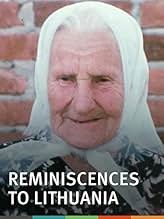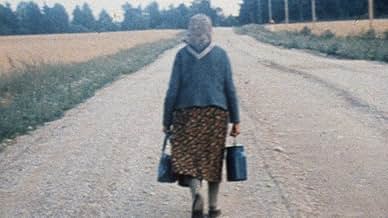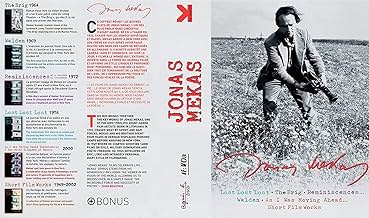Reminiscências de uma Viagem para a Lituânia
Título original: Reminiscences of a Journey to Lithuania
AVALIAÇÃO DA IMDb
7,5/10
1,3 mil
SUA AVALIAÇÃO
Adicionar um enredo no seu idiomaFilmmaker Jonas Mekas creates an elegiac diary of a trip to his home country of Lithuania.Filmmaker Jonas Mekas creates an elegiac diary of a trip to his home country of Lithuania.Filmmaker Jonas Mekas creates an elegiac diary of a trip to his home country of Lithuania.
- Direção
- Roteirista
- Artistas
- Prêmios
- 1 vitória no total
Enredo
Você sabia?
Avaliação em destaque
This is too distanced to connect to me. Here's the gist. Mekas returns to his homeland of Lithuania after so long, visits his old mother and old friends from school. Some things have changed, others have stayed the same, the way it always is. He follows his old mother around trying to capture, from his end, an ordinary day: the sitting and walking, the work.
Primarily, the problem is that for Mekas the images are intimate and familiar, emotionally charged, had to be since he is revisiting childhood here. But this is conveyed in a casual, almost indifferent way, a New York artist's way which is what Mekas was at this point. We experience this all in the same desultory way, from a filmic distance.
We only see him once in the film before the camera, and that is a cold image where he simply feeds logs to a fire where his mother cooks pancakes. Maybe there's a Lithuanian element here that I'm not able to reach. So I don't get the deep experience of the return, I get a diaristic snapshot of Lithuanian life. I don't see the returning son here, only the formal filmmaker. It's cold, without embrace.
Mekas had a famous falling out with Cassavetes in the early days, for reasons of narrative form in Shadows. I can only imagine the warmth and ragged truth of the film Cassavetes, a Greek, would have made about his return to the place of childhood.
This is interestingly reflected in the film here. Mekas is returning with his camera, looking to capture a slice of remembered life and contrasts. What happens all through the film is that people in spite of his efforts awkwardly arrange themselves to be filmed: they sing around the camera, his cousin's family poses for a photo. The very presence of the artificial eye creates artifice, disrupts the living flow.
Cool tidbit: we see at one point Wittgenstein's house in Vienna, the one designed by him. It's an ugly, cold, square thing, fittingly for a logician. Austrians are thinkers, taxonomists in the big dance of things, and Mekas, if nothing else, wants to film outside the logical box. The film ends with images of Vienna in flames, a fruit market burning, because, Mekas muses, the city doesn't want it, it wants to clear room for something modern.
Primarily, the problem is that for Mekas the images are intimate and familiar, emotionally charged, had to be since he is revisiting childhood here. But this is conveyed in a casual, almost indifferent way, a New York artist's way which is what Mekas was at this point. We experience this all in the same desultory way, from a filmic distance.
We only see him once in the film before the camera, and that is a cold image where he simply feeds logs to a fire where his mother cooks pancakes. Maybe there's a Lithuanian element here that I'm not able to reach. So I don't get the deep experience of the return, I get a diaristic snapshot of Lithuanian life. I don't see the returning son here, only the formal filmmaker. It's cold, without embrace.
Mekas had a famous falling out with Cassavetes in the early days, for reasons of narrative form in Shadows. I can only imagine the warmth and ragged truth of the film Cassavetes, a Greek, would have made about his return to the place of childhood.
This is interestingly reflected in the film here. Mekas is returning with his camera, looking to capture a slice of remembered life and contrasts. What happens all through the film is that people in spite of his efforts awkwardly arrange themselves to be filmed: they sing around the camera, his cousin's family poses for a photo. The very presence of the artificial eye creates artifice, disrupts the living flow.
Cool tidbit: we see at one point Wittgenstein's house in Vienna, the one designed by him. It's an ugly, cold, square thing, fittingly for a logician. Austrians are thinkers, taxonomists in the big dance of things, and Mekas, if nothing else, wants to film outside the logical box. The film ends with images of Vienna in flames, a fruit market burning, because, Mekas muses, the city doesn't want it, it wants to clear room for something modern.
- chaos-rampant
- 28 de jul. de 2013
- Link permanente
Principais escolhas
Faça login para avaliar e ver a lista de recomendações personalizadas
Detalhes
- Data de lançamento
- Países de origem
- Centrais de atendimento oficiais
- Idiomas
- Também conhecido como
- Reminiscences of a Journey to Lithuania
- Locações de filme
- Empresa de produção
- Consulte mais créditos da empresa na IMDbPro
Contribua para esta página
Sugerir uma alteração ou adicionar conteúdo ausente

Principal brecha
By what name was Reminiscências de uma Viagem para a Lituânia (1972) officially released in Canada in English?
Responda
















